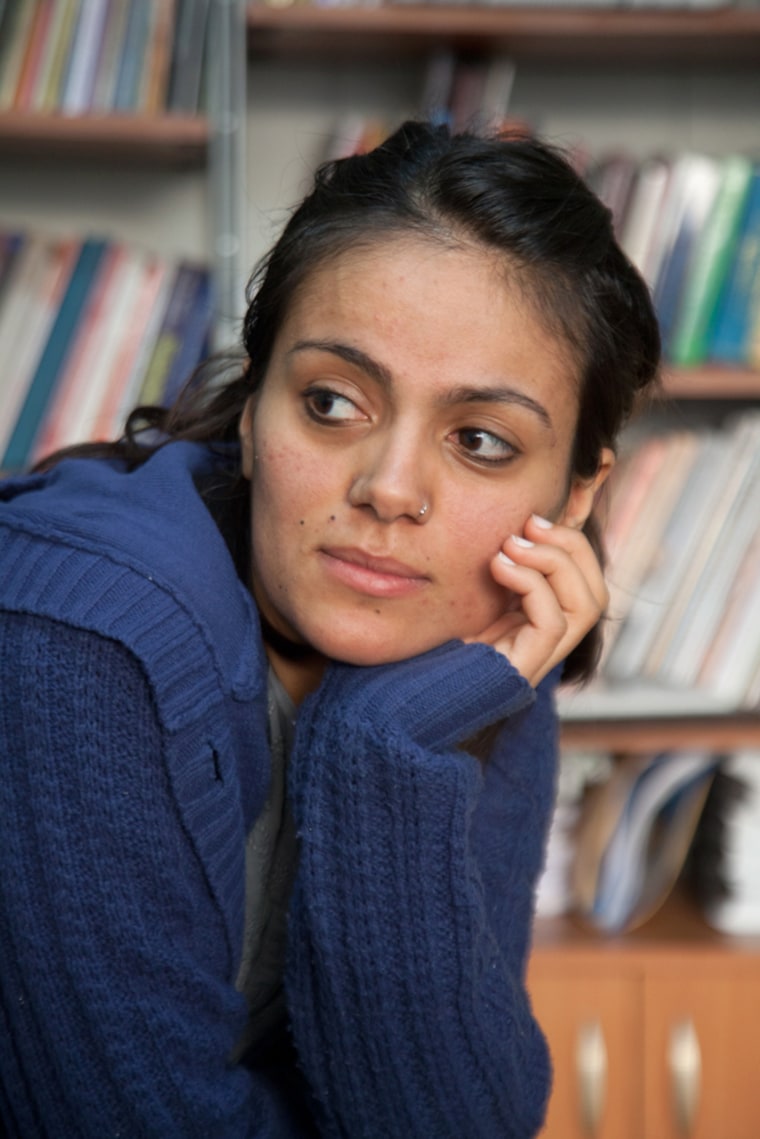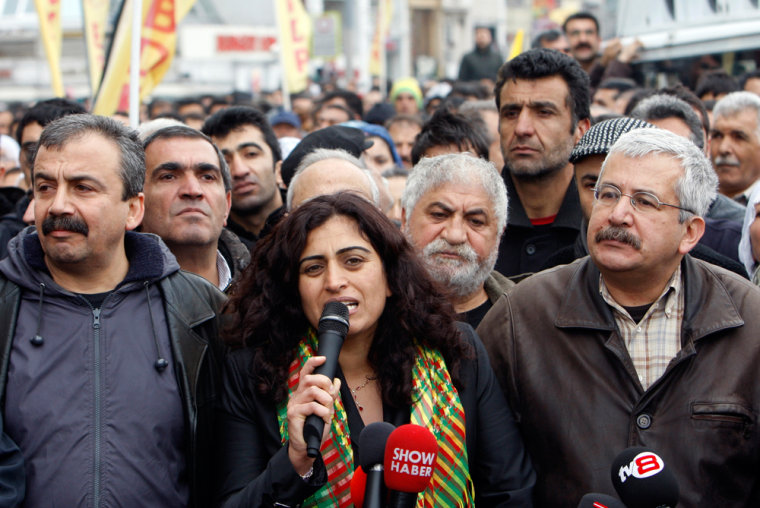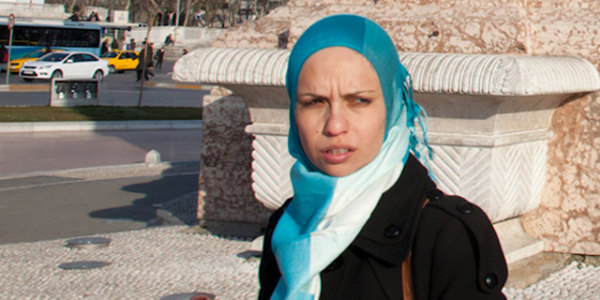A few dozen protesters held yellow banners emblazoned with "BDP" on an icy day in Turkey's largest city. Most pedestrians in Taksim, Istanbul's main shopping district, took little notice of the men wearing dingy dark jackets and women in fringed headscarves and peasant-style skirts.
Hundreds of riot police in body armor surrounded the gathering, two water cannons and tear gas at the ready. Plain-clothed police officers clutching walkie-talkies listened to journalists' conversations and demanded reporters' names and information about who they represented.
Judging from the official response, onlookers could be forgiven for thinking that the Peace and Democracy Party (BDP) was outlawed and demonstrations against the detention of Kurdish militant leader Abdullah Ocalan are illegal.
They aren't, but violence has erupted at similar protests in the past.
While there has been a lessening in tensions under the governing Justice and Development Party (AKP) — which has allowed the establishment of Kurdish-language television and radio channels — February's protest was part of a decades-long standoff between the Turkish state and the country's largest minority.
Autonomy is the crux of the conflict. Kurdish nationalists demand more power to govern themselves, but successive governments have been unwilling to grant it, says Fadi Hakura, a Turkey expert at London-based think tank Chatham House.
"Modern Turkey is a very centralized state where key powers of government are held in (the capital) Ankara," he says. "This has been the nature of the Turkish state since its founding."
Open warfare
Fearful that Kurds, who make up an estimated 20 percent of the population, would try to create an independent country, successive Turkish governments have tried to force them to assimilate. In 1980, the Kurdish language was outlawed and Ocalan's Kurdish Workers Party (PKK) kicked off a separatist insurgency four years later.
For nearly two decades until Ocalan's capture, the PKK and the military were openly at war. The conflict claimed more than 30,000 lives, depopulated swathes of the southeast and displaced millions. Torture was common and thousands were killed or disappeared at the hands of the army and pro-government death squads, according to Human Rights Watch.
While violence has largely died down, a peace initiative launched by the AKP in 2009 has produced little progress, Kurdish leaders and rights groups say. In February, the PKK ended a six-month unilateral cease-fire and a month later fighters launched a rocket attack at a police station in the southeast.
Many Kurds had hoped that things would change under the AKP, BDP lawmaker Sebahat Tuncel told msnbc.com.
"As Kurds we decided to live together so now it is time for Turks to decide if they want to live together," she said, referring to the fact that the main Kurdish groups have renounced separatism.
In April, Human Rights Watch complained about the prosecution of hundreds of BDP members, lawmakers and activists under tough anti-terror laws.
"Without compelling evidence of violent activities, it's hard to see the prosecution's effort to link this legal party with an illegal organization as anything but a clampdown on legitimate political activity," said Benjamin Ward, deputy Europe and Central Asia director at Human Rights Watch.
Slideshow 9 photos
Istanbul: An emerging power's ancient heart
Wednesday's decision by Turkey's High Election Board to bar 12 pro-Kurdish politicians from upcoming elections because of previous criminal convictions heightened tensions. After the edict, demonstrators gathered in Istanbul and Ankara and police clashed with thousands of protesters in the Kurdish heartland in the southeast.
Tuncel was among those barred from running. The decision was based on a demonstration she attended in 2007, said Gunes Dasli, an aide to Tuncel. Authorities opened a case against the lawmaker after the protest, a fact that Tuncel and her campaign only discovered "last week," Dasli told msnbc.com.
'Pushed aside'
While some Kurds, especially those in more religious communities, voted for the governing AKP in past elections, many still feel they lack fundamental rights.
Mutha Getin, a Kurdish journalist in Istanbul, says she and her family have always been treated like second-class citizens.

"We went to rent a house; they wouldn't give it to us because we were Kurdish," said 22-year-old Getin, whose family moved to Istanbul when she was five, after her brother joined the outlawed PKK. Her family hoped to escape violence in the southeast.
"We were pushed aside from society," she said.
At 19, Getin was detained and spent 16 months in jail after being accused of being a member of the PKK. She is still regularly stopped by police and the persistent echo on her cellphone convinces her it is tapped.
"They want to show you they have the power, that they can touch you and anyone around you," she said.
This feeling of disillusionment among Kurds who have tried to be part of the political process is growing, according to Tuncel's adviser Dasli.
"Before, (the AKP told the Kurds) 'don't go to the mountain, go to Ankara, be part of the legal process,'" she said, referring to how Kurdish militants have traditionally gone "to the mountains" and joined the PKK.
"N ow, the AKP says, 'go to mountain, don't go to Ankara.'"

